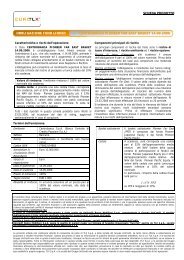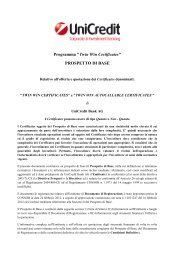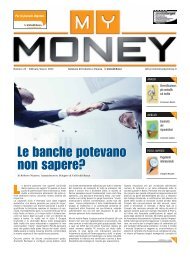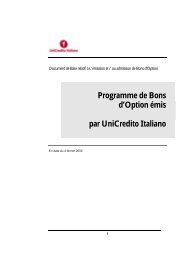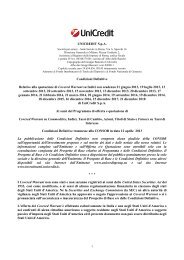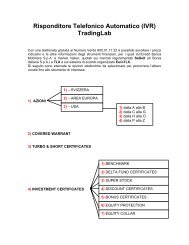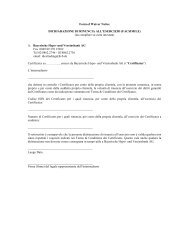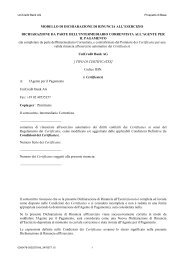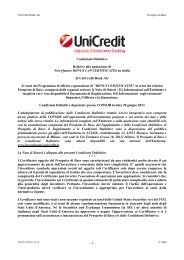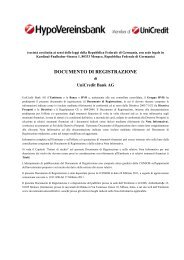HVB DIP 2006-Title Summaryv13.DOC - UniCredit
HVB DIP 2006-Title Summaryv13.DOC - UniCredit
HVB DIP 2006-Title Summaryv13.DOC - UniCredit
Create successful ePaper yourself
Turn your PDF publications into a flip-book with our unique Google optimized e-Paper software.
40<br />
Like other banks, <strong>HVB</strong> Group is exposed to the risk that third parties who owe the Group money, securities and<br />
other assets will not perform their obligations. Many of <strong>HVB</strong> Group’s businesses activities beyond the traditional<br />
banking business of lending and deposit-taking also expose it to credit risk.<br />
Non-traditional credit risk can, for example, arise from:<br />
• holding securities of third parties;<br />
• entering into derivative contracts under which counterparties have obligations to make payments to Group<br />
entities;<br />
• executing securities, futures, currency or commodity trades that fail to settle at the required time due to<br />
non-delivery by the counterparty or systems failure by clearing agents, exchanges, clearing houses or<br />
other financial intermediaries; and<br />
• extending credit through other arrangements.<br />
Parties to these transactions, such as trading counterparties, may default on their obligations to <strong>HVB</strong> Group due<br />
to insolvency, political and economic events, lack of market liquidity, operational failure or other reasons. This<br />
risk may potentially increase if <strong>HVB</strong> Group focuses – with the aim of sustainably improving its profitability –<br />
more than in the past on capital markets-oriented business rather than on traditional lending business. Defaults<br />
with respect to a significant number of transactions or one or more transactions that involve significant volumes<br />
could adversely affect <strong>HVB</strong> Group’s results of operations and financial condition.<br />
<strong>HVB</strong> Group’s Risk Management Strategies and Techniques May Leave <strong>HVB</strong> Group Exposed to Unidentified<br />
or Unanticipated Risks<br />
Although <strong>HVB</strong> Group invests substantial time and effort in its risk management strategies and techniques, they<br />
may nonetheless fail under some circumstances, particularly if <strong>HVB</strong> Group is confronted with risks that it has<br />
not identified or anticipated. Some of the Group’s methods for managing risk are based upon observations of<br />
historical market behavior. Statistical techniques are applied to these observations to arrive at quantifications of<br />
<strong>HVB</strong> Group’s risk exposures. If circumstances arise that <strong>HVB</strong> Group did not identify, anticipate or correctly<br />
evaluate in developing its statistical models, the Group’s losses could be greater than expected. Furthermore, the<br />
quantifications do not take all risks or market conditions into account. If the measures used to assess and mitigate<br />
risk prove insufficient, <strong>HVB</strong> Group may experience material unexpected losses. Many of the Group’s more sophisticated<br />
trading and investment transactions are designed to profit from price movements and differences between<br />
prices. If prices move in a way that the Group’s risk modeling has not anticipated, <strong>HVB</strong> Group may experience<br />
significant losses. Assets that are not traded on public markets, such as derivatives contracts between<br />
banks, may be assigned values that are calculated using mathematical models. Monitoring the deterioration of<br />
assets like these can be difficult and may lead to unanticipated losses.<br />
HypoVereinsbank and Other <strong>HVB</strong> Group Companies Face Litigation Risks<br />
For a description of certain litigation and investigations a prospective investor should carefully consider before<br />
making a decision to invest in the shares of HypoVereinsbank, see “Business of <strong>HVB</strong> Group—Legal Proceedings.”<br />
Regulatory Risks<br />
The Regulatory Environment for <strong>HVB</strong> Group May Change; Non-compliance With Regulatory Requirements<br />
May Result in Enforcement Measures<br />
<strong>HVB</strong> Group’s operations are regulated and supervised by the central banks and regulatory authorities in each of<br />
the jurisdictions where it conducts business. In each of these countries, <strong>HVB</strong> Group’s operations require a banking<br />
license or at least a notification to the national regulator. The bank regulatory regimes in the various local<br />
jurisdictions are subject to change. Changes in the regulatory requirements in a relevant jurisdiction may impose<br />
additional obligations on <strong>HVB</strong> Group companies. In addition, compliance with the revised regulatory requirements<br />
may result in a significant increase in administrative expenses which may have an adverse impact on <strong>HVB</strong><br />
Group’s financial condition and results of operations.<br />
There is a risk that in the case of a repeated violation of the regulatory requirements in any relevant jurisdiction,<br />
the banking license granted to a company of the <strong>HVB</strong> Group in such jurisdiction will be revoked or limited. In<br />
Germany, <strong>HVB</strong> Group is regulated by the BaFin. The BaFin has a wide range of enforcement powers in the<br />
event it discovers any irregularities. Among other things, if HypoVereinsbank’s or <strong>HVB</strong> Group’s own funds or<br />
liquidity requirements do not meet the statutory minimum requirements, the BaFin may prohibit <strong>HVB</strong> Group<br />
from extending further credits. Should there be a risk that a bank may not be able to perform its obligations visà-vis<br />
its creditors, the BaFin may, for the purpose of avoiding such risk, impose a “section 46a moratorium” on<br />
the German banking subsidiaries of <strong>HVB</strong> Group, i.e., prohibit the disposal of assets and the making of payments,



